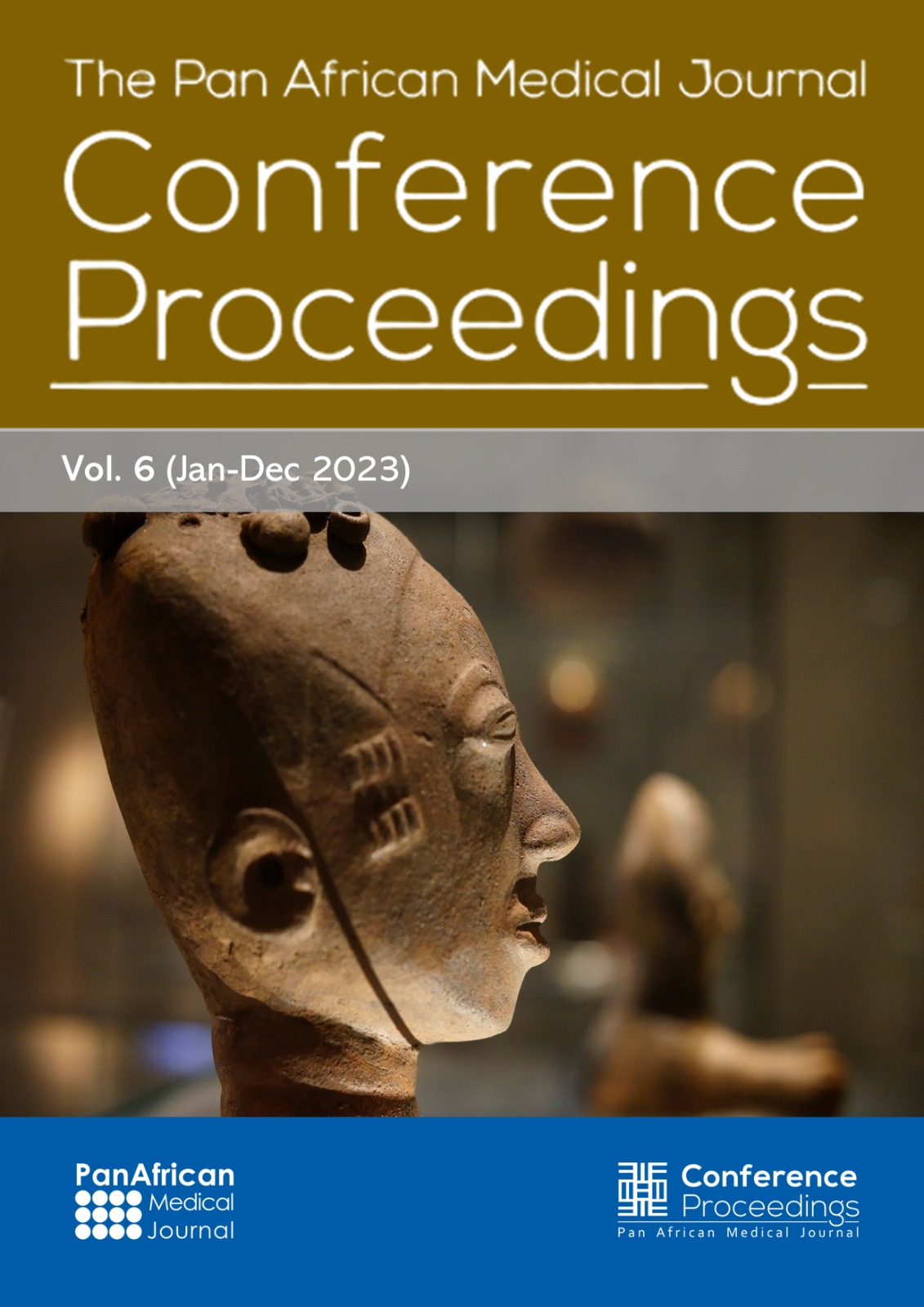Conference abstract
Assessment of oral health knowledge among caregivers of children in preschool centres, Ibadan, Nigeria
Pan African Medical Journal - Conference Proceedings. 2022:13(15).03
Feb 2022.
doi: 10.11604/pamj-cp.2022.13.15.875
Archived on: 03 Feb 2022
Contact the corresponding author
Keywords: Caregivers, oral health knowledge, parents, preschool oral health
Oral presentation
Assessment of oral health knowledge among caregivers of children in preschool centres, Ibadan, Nigeria
Mary Ebelechukwu Osuh1,&, Juliana Obontu Taiwo1, Gbemisola Aderemi Oke1
1Department of Periodontology and Community Dentistry, University of Ibadan, Ibadan, Oyo State, Nigeria
&Corresponding author
Introduction: preschool centres are increasingly seen as home extensions and its caregivers as second mothers to the children. In order to plan an effective delivery of oral health care virtues for the growing children, this study assessed the profile of oral health knowledge of Ibadan preschool caregivers as a baseline data.
Methods: the study was a descriptive cross sectional survey in which a 3-stage sampling technique was used to select 362 eligible participants. Responses to various aspects on oral health promoting factors in children including oral hygiene, diet and fluoride were sought from the participants. Scoring was done based on participants’ responses to 20 knowledge questions. Data was analysed using SPSS. Appropriate test statistics were used to analyse association between variables at 5% significance level.
Results: Two hundred and eighty-two (77.9%) caregivers had good knowledge of preschool oral health, but about 56% each did not know that caries could occur in children < 2 years of age, and that pre-chewing of baby’s food by an adult was unhygienic. Three hundred and six (84.5) did not know that frequent swallowing of toothpaste in children could cause staining in the adult teeth. Good knowledge was associated with having an ECCE training (p < 0.005). Lower level of education and not having an ECCE training were both associated with an incorrect response on whether the risk of tooth decay could increase with increased sugar in snacks (P < 0.005 each).
Conclusion: the caregivers had preschool oral health information discrepancies. A targeted and aggressive oral health education programmes is recommended for caregivers in preschool centres.
Assessment of oral health knowledge among caregivers of children in preschool centres, Ibadan, Nigeria
Mary Ebelechukwu Osuh1,&, Juliana Obontu Taiwo1, Gbemisola Aderemi Oke1
1Department of Periodontology and Community Dentistry, University of Ibadan, Ibadan, Oyo State, Nigeria
&Corresponding author
Introduction: preschool centres are increasingly seen as home extensions and its caregivers as second mothers to the children. In order to plan an effective delivery of oral health care virtues for the growing children, this study assessed the profile of oral health knowledge of Ibadan preschool caregivers as a baseline data.
Methods: the study was a descriptive cross sectional survey in which a 3-stage sampling technique was used to select 362 eligible participants. Responses to various aspects on oral health promoting factors in children including oral hygiene, diet and fluoride were sought from the participants. Scoring was done based on participants’ responses to 20 knowledge questions. Data was analysed using SPSS. Appropriate test statistics were used to analyse association between variables at 5% significance level.
Results: Two hundred and eighty-two (77.9%) caregivers had good knowledge of preschool oral health, but about 56% each did not know that caries could occur in children < 2 years of age, and that pre-chewing of baby’s food by an adult was unhygienic. Three hundred and six (84.5) did not know that frequent swallowing of toothpaste in children could cause staining in the adult teeth. Good knowledge was associated with having an ECCE training (p < 0.005). Lower level of education and not having an ECCE training were both associated with an incorrect response on whether the risk of tooth decay could increase with increased sugar in snacks (P < 0.005 each).
Conclusion: the caregivers had preschool oral health information discrepancies. A targeted and aggressive oral health education programmes is recommended for caregivers in preschool centres.








